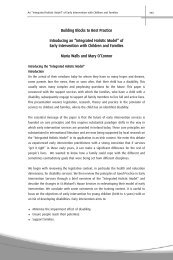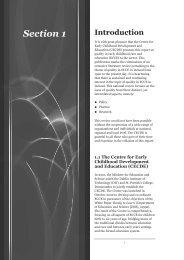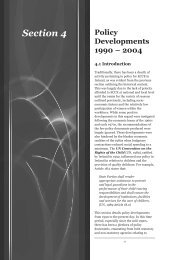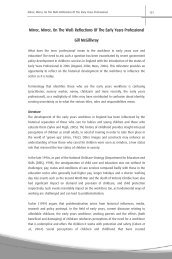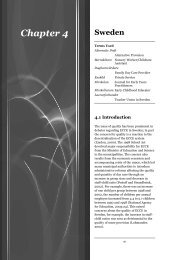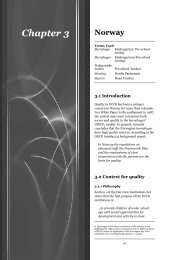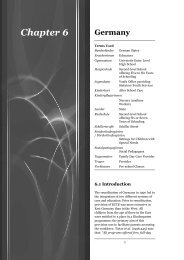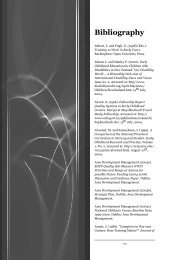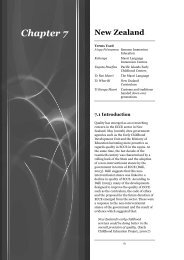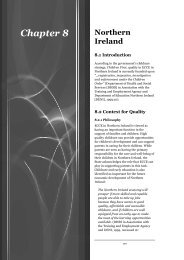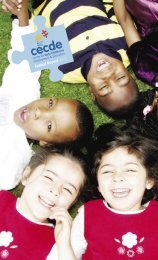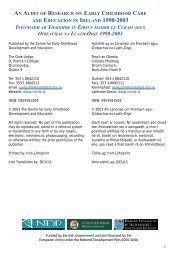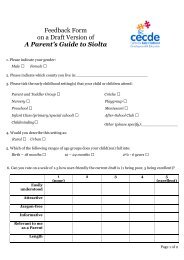Parental Involvement in Early Years Education, with a particular ...
Parental Involvement in Early Years Education, with a particular ...
Parental Involvement in Early Years Education, with a particular ...
You also want an ePaper? Increase the reach of your titles
YUMPU automatically turns print PDFs into web optimized ePapers that Google loves.
An Lárionad um Fhorbairt<br />
agus Oideachas na Luath-Óige<br />
<strong>Parental</strong> <strong>Involvement</strong> <strong>in</strong> <strong>Early</strong> <strong>Years</strong> <strong>Education</strong>,<br />
<strong>with</strong> a <strong>particular</strong> focus on Travellers<br />
Abstract from a work <strong>in</strong> progress<br />
By Anne Boyle
<strong>Parental</strong> <strong>Involvement</strong> <strong>in</strong> <strong>Early</strong> <strong>Years</strong> <strong>Education</strong>, <strong>with</strong> a <strong>particular</strong> focus on Travellers © CECDE 2004<br />
The preschools for Travellers National Evaluation Report recommended that “Each preschool should<br />
… develop and implement a policy to encourage <strong>in</strong>volvement by parents” (p. 86). A genu<strong>in</strong>e<br />
partnership between the parents and the educators will benefit the child and ensure cont<strong>in</strong>uity<br />
between the home and the school.<br />
The Traveller preschools evolved from a concern regard<strong>in</strong>g the low numbers of Traveller children<br />
attend<strong>in</strong>g primary school as reported by the Commission of It<strong>in</strong>erancy 1963. They were established by<br />
voluntary effort and s<strong>in</strong>ce the 1970s have been part funded by the Department of <strong>Education</strong> and<br />
Science as one of the compensatory programmes for Traveller children. In the 1970s, Travellers were<br />
regarded as be<strong>in</strong>g <strong>in</strong> deficit and the perceived solution lay <strong>in</strong> chang<strong>in</strong>g them so that they would<br />
become more like the majority. Sr. Colette Dwyer wrote <strong>in</strong> 1974, “A Travell<strong>in</strong>g child is never taught to<br />
speak – it picks up what it can from the very limited vocabulary it hears used by the older children<br />
and adults. The experience of a Traveller child, as compared <strong>with</strong> that of a child <strong>in</strong> the settled<br />
community, is <strong>in</strong>credibly limited” (Travell<strong>in</strong>g People, p. 94). This view of m<strong>in</strong>ority children was<br />
common <strong>in</strong> the US also, accord<strong>in</strong>g to William Labov <strong>in</strong> his analysis of the Headstart Programme.<br />
Mean<strong>in</strong>gful partnership <strong>with</strong> parents is one way of ensur<strong>in</strong>g the child’s cultural background is<br />
reflected <strong>in</strong> educational decision mak<strong>in</strong>g. Kathleen Lynch says, “Much talent and commitment is lost<br />
when school<strong>in</strong>g does not recognise cultural difference”. The Task Force Report on the Travell<strong>in</strong>g<br />
Community 1995 recommended that “consultation and <strong>in</strong>volvement <strong>with</strong> preschools of parents …<br />
should be encouraged and developed” (FR41, p. 173). My research <strong>in</strong> 1995 <strong>in</strong>dicated a limited<br />
<strong>in</strong>volvement of parents <strong>in</strong> the operation of the Traveller preschools (M.Ed. thesis, UCG).<br />
Parents have a constitutional right to <strong>in</strong>volvement <strong>in</strong> their children’s education and many policy<br />
documents and reports over the years have emphasised the importance of this.<br />
When the <strong>Early</strong> Start Preschools were piloted <strong>in</strong> 1994, parental <strong>in</strong>volvement was build <strong>in</strong>to the<br />
programme <strong>in</strong> three ways:<br />
• Parents were present <strong>in</strong> the classroom.<br />
• Learn<strong>in</strong>g activities were sent home<br />
• Courses for parents.<br />
Accord<strong>in</strong>g to the evaluation of the programme, parents were <strong>in</strong>volved <strong>in</strong> to vary<strong>in</strong>g degrees <strong>in</strong> all<br />
three aspects. The Home School Community Liaison Scheme is another <strong>in</strong>itiative which promotes<br />
“partnership between parents and teachers” (Conaty, p. 69).<br />
<strong>Parental</strong> <strong>Involvement</strong> requires partnership, respect for diversity and trust between parents and the<br />
school. For this to be mean<strong>in</strong>gful it is necessary to engage <strong>in</strong> dialogue. Paulo Freire says, “Without<br />
dialogue there can be no communication, and <strong>with</strong>out communication there can be no true<br />
education” (p. 65).<br />
The Task Force and the Evaluation Reports call for parents to access the school directly, <strong>with</strong>out<br />
mediators. Mechanisms to <strong>in</strong>volve parents should reach out to all parents and not simply select those<br />
who f<strong>in</strong>d it easier to relate to the school.<br />
<strong>Parental</strong> <strong>Involvement</strong> is one way of ensur<strong>in</strong>g that the home culture is reflected <strong>in</strong> the school. Louise<br />
Derman Sparks says “when schools devaluate or fail to recognise home-culture strengths … they take<br />
away the tools the family and child have to be effective”. She also shows how people can imply an<br />
unjustified equivalence between diversity and disadvantage where the victim of a societal problem is<br />
2
<strong>Parental</strong> <strong>Involvement</strong> <strong>in</strong> <strong>Early</strong> <strong>Years</strong> <strong>Education</strong>, <strong>with</strong> a <strong>particular</strong> focus on Travellers © CECDE 2004<br />
identified as the source of the problem. When this happens the child is seen as disadvantaged because<br />
of difference, and regarded as be<strong>in</strong>g <strong>in</strong> deficit <strong>in</strong> comparison <strong>with</strong> the majority.<br />
Tra<strong>in</strong><strong>in</strong>g for educators and parents is needed to build a partnership, based on trust and respect for<br />
diversity, that will benefit the child, the family and the school.<br />
3



